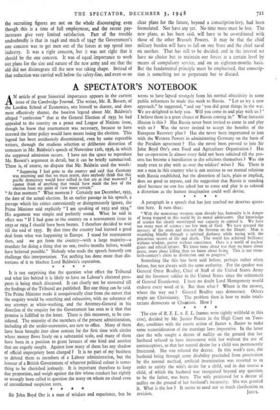A SPECTATOR 'S NOTEBOOK N article of great historical importance
appears in the current' issue of the Cambridge lournal. The writer, Mr. R. Bassett, of the London School of Economics, sets himself to shatter, and does most effectively shatter, the baseless legend about Mr. Baldwin's alleged " confession " that at the General Election of 1935 he had appealed to the country on a peace and League of Nations issue, though he knew that rearmament was necessary, because to have stressed the latter policy would have meant losing the election. This legend has been assiduously disseminated, even by some reputable writers, through the studious selection or deliberate distortion of sentences in Mr. Baldwin's speech of November nth, 1936, in which the supposed admission occurs. I have not the space to reproduce Mr. Bassetes -argument in detail, but it can be briefly summarised. There is, of course, no dispute that Mr. Baldwin used the words : "Supposing I had gone, to the country and said that Germany was rearming and that we must rearm, does anybody think that this pacific democracy would have rallied to that cry at that moment? I cannot think of anything that would have made the loss of the election from my point of view more certain."
"At that moment." What moment ? Certainly not December, 1935, the date of the actual election. In an earlier passage in his speech, a passage which his critics conveniently or disingenuously ignore, the Prime Minister said explicitly "I am speaking of 1933 and 1934." His argument was simple and perfectly sound. What he said in effect was "If I had gone to the country on a rearmament issue in 1933 or 1934 I should have been beaten. I therefore decided to wait till the end of 1935. By that time the country had learned a good deal from what was happening in Europe. I stood for rearmament then, and we got from the country—with a large majority—a mandate for doing a thing that no one, twelve Months before, would have believed possible." Nobody who reads the speech honestly can challenge this interpretation. Yet nothing has done more than dis- tortions of it to blacken Lord Baldwin's reputation.


































 Previous page
Previous page